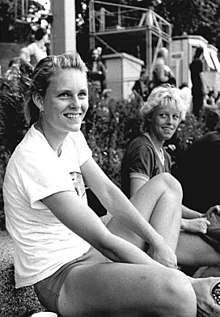Katrin Krabbe
 Krabbe in 1988 | |||||||||||||||||||||||||||||||||||||||
| Personal information | |||||||||||||||||||||||||||||||||||||||
|---|---|---|---|---|---|---|---|---|---|---|---|---|---|---|---|---|---|---|---|---|---|---|---|---|---|---|---|---|---|---|---|---|---|---|---|---|---|---|---|
| Born | 22 November 1969[1] Neubrandenburg, East Germany[1] | ||||||||||||||||||||||||||||||||||||||
| Height | 182 cm (6 ft 0 in)[1] | ||||||||||||||||||||||||||||||||||||||
| Weight | 69 kg (152 lb)[1] | ||||||||||||||||||||||||||||||||||||||
| Sport | |||||||||||||||||||||||||||||||||||||||
| Country | East Germany | ||||||||||||||||||||||||||||||||||||||
| Sport | Athletics | ||||||||||||||||||||||||||||||||||||||
| Event | Women's sprints | ||||||||||||||||||||||||||||||||||||||
Medal record
| |||||||||||||||||||||||||||||||||||||||
| Updated on 9 February 2014 | |||||||||||||||||||||||||||||||||||||||
Katrin Krabbe (German pronunciation: [ˈkatʁiːn ˈkʁabə] ⓘ; later Zimmermann; born 22 November 1969) is a German former track and field athlete. She represented East Germany (GDR) at the 1988 Seoul Olympics, and went on to win the 100 metres and 200 metres titles at the 1991 World Championships in Tokyo, representing a unified Germany. Her best times are 10.89 secs for 100m (1988) and 21.95 secs for 200m (1990).
Life and career
[edit]Krabbe was a successful track star, winning the 100 m and 200 m titles in the 1990 European Athletics Championships (held in Split) and the same titles at the 1991 World Championships in Athletics (held in Tokyo, where she beat Gwen Torrence and Merlene Ottey). She was also part of the winning 4 × 100 metres relay East German women's team in the European Championships.
In 1992, Krabbe along with teammates Silke Möller and Grit Breuer tested positive for the stimulant clenbuterol.[2][3][4] All three athletes were suspended for one year by the German Athletics Federation, but the International Association of Athletics Federations (IAAF) extended this to two years. Krabbe sued the IAAF and received damages (1.2 million DM), while Breuer did not and was able to compete again after the ban. The suspension kept Krabbe from competing in the 1992 Summer Olympics, and effectively ended her athletic career.
Personal bests
[edit]100 m – 10.89 +1.8 (Berlin 20 July 1988)
200 m – 21.95 +0.3 (Split 30 August 1990)
Achievements
[edit]| Year | Competition | Venue | Position | Event | Notes |
|---|---|---|---|---|---|
| Representing | |||||
| 1986 | World Junior Championships | Athens, Greece | 4th | 100 m | 11.49 (wind: +0.9 m/s) |
| 3rd | 200 m | 23.31 (wind: +0.6 m/s) | |||
| 2nd | 4 × 100 m | 43.97 | |||
| 1987 | European Junior Championships | Birmingham, England | 1st | 4 × 100 m | 44.62 |
| 1988 | World Junior Championships | Greater Sudbury, Canada | 2nd | 100 m | 11.23 (wind: -0.4 m/s) |
| 1st | 200 m | 22.34 w (wind: +2.3 m/s) | |||
| 1st | 4 × 100 m | 43.48 | |||
| Olympic Games | Seoul, South Korea | semi-final | 200 m | 22.59 | |
| 1990 | European Championships | Split, Yugoslavia | 1st | 100 m | 10.89 (wind: +1.8 m/s) |
| 1st | 200 m | 21.95 (wind: +0.3 m/s) | |||
| 1st | 4 × 100 m | 41.68 | |||
| Representing | |||||
| 1991 | World Indoor Championships | Seville, Spain | 6th | 60 m | 7.20 |
| World Championships | Tokyo, Japan | 1st | 100 m | 10.99 | |
| 1st | 200 m | 22.09 | |||
| 3rd | 4 × 100 m | 42.33 | |||
| 3rd | 4 × 400 m | 3:21.25 | |||
See also
[edit]- List of sportspeople sanctioned for doping offences
- German all-time top lists – 100 metres
- German all-time top lists – 200 metres
References
[edit]- ^ a b c d Evans, Hilary; Gjerde, Arild; Heijmans, Jeroen; Mallon, Bill; et al. "Katrin Krabbe". Olympics at Sports-Reference.com. Sports Reference LLC. Archived from the original on 18 April 2020. Retrieved 9 February 2014.
- ^ "Philip Hersh - Series on Athletics in the GDR". Runnersweb.com. Retrieved 3 December 2018.
- ^ "Krabbe receives IAAF settlement". News.bbc.co.uk. 30 April 2002.
- ^ "Sports & Recreation". archive.today. 30 June 2012. Archived from the original on 30 June 2012. Retrieved 3 December 2018.
External links
[edit]- Katrin Krabbe at World Athletics
- RunnersWeb.com article
- Sports Illustrated article Archived 4 February 2009 at the Wayback Machine
- 1969 births
- Living people
- People from Neubrandenburg
- Athletes from Mecklenburg-Western Pomerania
- East German female sprinters
- German female sprinters
- Doping cases in athletics
- German sportspeople in doping cases
- Olympic athletes for East Germany
- Athletes (track and field) at the 1988 Summer Olympics
- World Athletics Championships medalists
- European Athletics Championships medalists
- World Athletics Championships athletes for Germany
- IAAF World Athlete of the Year
- World Athletics Championships winners
- Olympic female sprinters
- Sportspeople from Bezirk Neubrandenburg
- East German Athletics Championships winners
